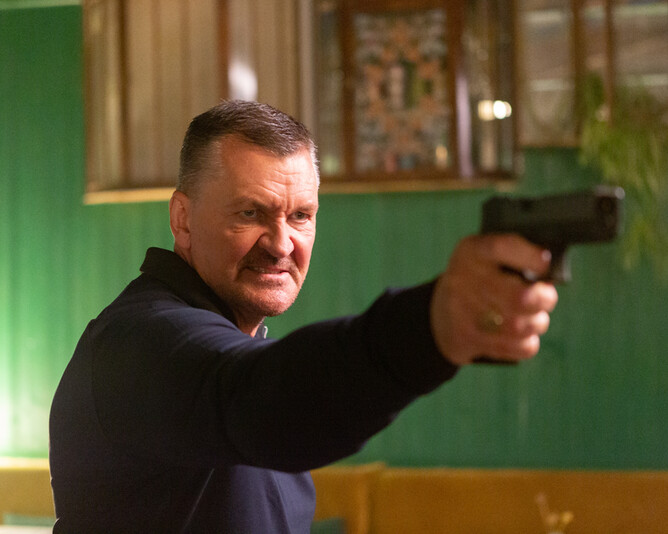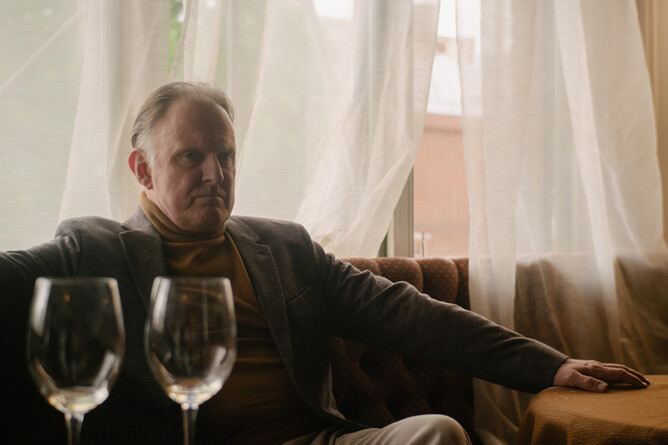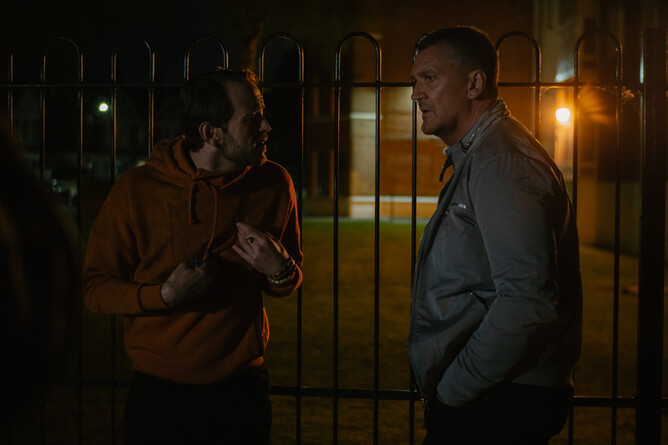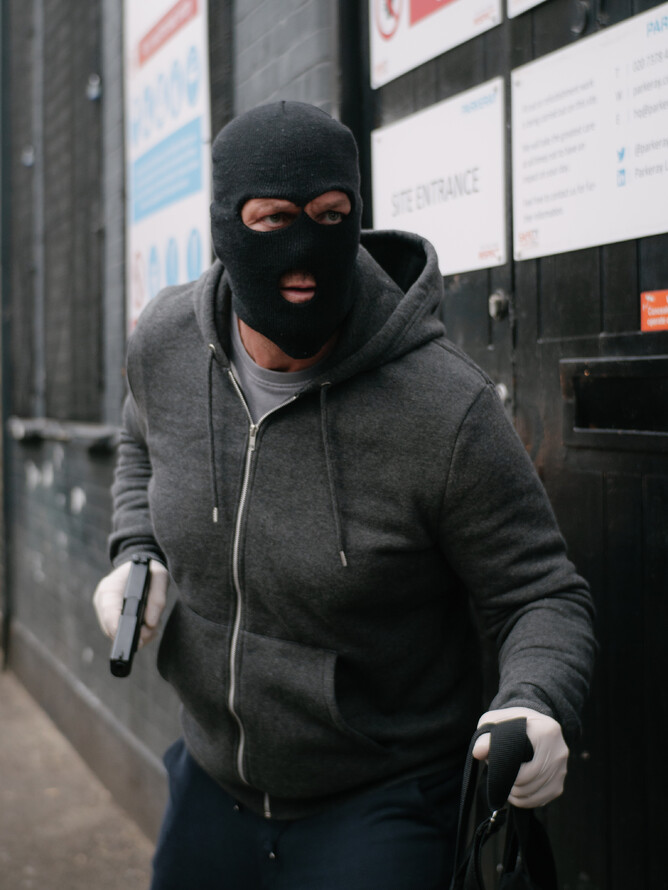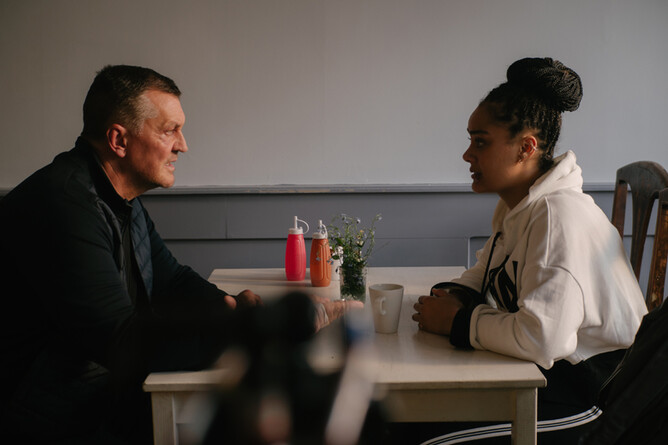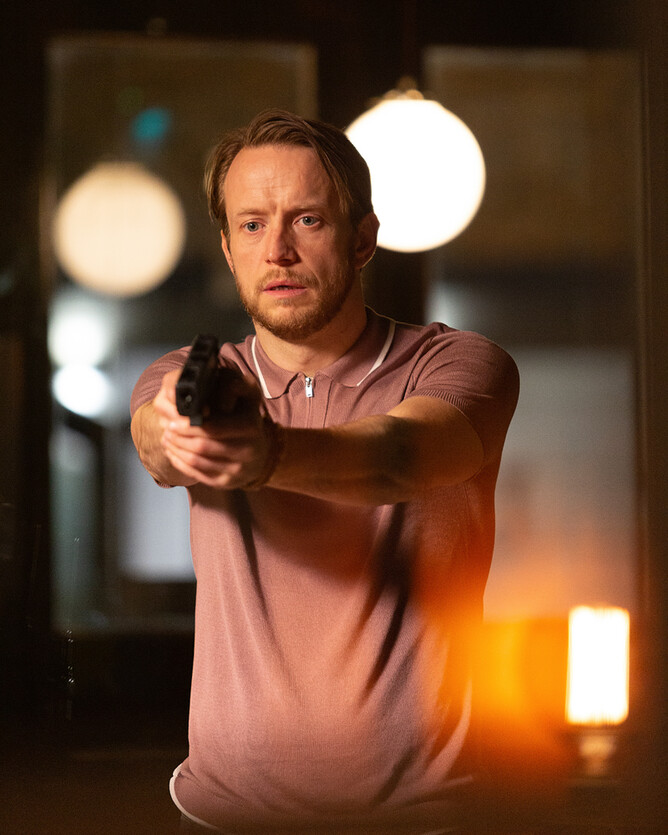Vertigo Presents: VILLAIN In Cinemas & On Digital 28th February 2020.
Craig Fairbrass gets emotional in a tale of loyalty, family and redemption, in a superior take on the British independent gangster film.
On his release from prison Eddie Franks returns to home turf determined to leave his criminal past behind him and make good on his responsibilities as a brother and father. Met by his brother Sean (George Russo), Eddie returns to find the pub he and his brother own soon under threat from the drug debt owed to local hardman Roy Garrett (Robert Glenister) by Sean. Determined to resolve the financial issues through honest, hard graft, Eddie works to make a success of the pub, while reconnecting with both his brother and his daughter Chloe (Izuka Hoyle). Brotherly bonds and principles are tested as it becomes clear the extent to which Sean is a liability to both the pub and to Eddie, presenting Eddie with a moral dilemma all their futures rest on. As the path out of criminality to be a family man becomes rocky for the reformed Eddie, the question is, as always, will he manage to break with his past? Or will the immortal words of Michael Corleone, “Just when I thought I was out…they pull me back in” loom ominously for Eddie?
VILLAIN is an intelligent and deftly executed genre piece.
So far, so typical a plot for a gangster film. And there is much to the film that is familiar. The narrative is still male-centric, founded in London criminality and boasting a cameo from a British acting stalwart, the ever-watchable Robert Glenister. But this is part of Villain’s strength and should not be taken as a criticism. Here there is pleasure in watching the familiar because the film is an intelligent and deftly executed genre piece. What’s not to like? And what distinguishes Villain from the usual British generic output is the quality of the writing and performances which provide the film with an emotional register and widens the cinematic world beyond that of the spectacle of toxic criminality.
Central to the film are the familial ties and the responsibility Eddie feels towards his brother, Sean and to his daughter, Chloe,
Central to the film are the familial ties and the responsibility Eddie feels towards his brother, Sean and to his daughter, Chloe. These plot threads draw out the drama and tension of the film, while notable performances by Fairbrass, Russo and Hoyle rejuvenate what could so easily have been stereotypical and tired renditions of types we’ve all seen before. The film’s closing sequences neatly brings all the threads of Eddie’s predicament into focus, with revelations that provide a satisfying emotional, and in places an unexpected, climax to the film. The effectiveness of the closure owes much to Philip Barantini’s direction and handling of the script at the helm of his first feature, and Izuke Hoyle’s performance as Chloe Franks.
Fairbrass plays Eddie with an unexpected warmth and vulnerability.
Central to the film is of course the character of Eddie and the performance of Craig Fairbrass. Fairbrass has etched out a film career playing hardmen Danny Dyer, now in the safety of Eastenders, ran away from playing. Fairbrass’s resilience has been rewarded with a success on the British independent film scene that now eclipses his time in Eastenders (take note Dyer) and an early stint in Hollywood. Previous film roles demonstrate his ability to carry a film, but more is demanded of him in Villain and Eddie provides the opportunity for Fairbrass to display a softer side in tackling the moral complexities inherent to ‘the criminal turned family man’ narrative. The chance of redemption here is bound up with grief, loss, and fatherhood. For once Fairbrass gets to play a character that deserves our empathy, and he plays Eddie with an unexpected warmth and vulnerability. With another film, Muscle, due for release this year, there is a gathering buzz around Fairbrass and 2020 could prove to pivotal for his career.
Both George Russo and Izuke Holye deserve a mention for their supporting roles.
Both George Russo and Izuke Holye deserve a mention for their supporting roles. Russo, fresh from the short Smack Edd, is beginning to carve out a niche for playing fragile and desperate men. And no one plays desperation quite like Russo. Russo’s face is etched with fragility and is all vulnerability and anxiety as it crumples when Sean is confronted with more powerful men than him. Sean is all too brittle. While the opening scene serves to arouse sympathy for Sean, the response is tested as the film progresses, for what we initially recognised as fragility is in fact a weakness of a man too easily compromised when placed under pressure. It’s another performance that demonstrates why Russo’s talent is deserving of a far wider audience. Izuke Hoyle’s previous work has been both on TV (Jerk and Clique) and a film role in Mary Queen of Scots. Here, Hoyle gets a lucky break playing a female character who isn’t required to strip or take drugs. But as a victim of male violence Chloe doesn’t escape entirely. Hoyle takes the opportunity to bring a steeliness to a female character that isn’t based upon abuse, but rather on loss and betrayal. It is a credit to her acting ability that she is tasked with embodying the film’s poignancy in a brutal closure that Hoyle performs with a naturalness and sensitivity.
Greg Hall & George Russo have crafted a script that broadens the narrative scope beyond the usual toxic, London male violence and revenge,
But these performances would not have been possible without the maturity and quality of the script. Writers, Greg Hall (The Plague, Kapital) and George Russo clearly made a choice to move things on from the likes of the Footsoldier and Bonded by Blood series, and have crafted a script that broadens the narrative scope beyond the usual toxic, London male violence and revenge by introducing drama and an emotional depth not typical of the British hardman film. Villain is a cinematic literate film that acknowledges both the British and American heritage of the gangster film and uses this knowledge to produce an effective tragedy in the tradition of the genre. It’s an intelligent script that recognises why the genre requires more than the guns and tits of a bloody spectacle and the ornamental function of female nudity. The film understands how a tale of redemption brings its own dramatic tension and pleasure in a pay-off that wrong-foots the audience.
Villain feels fresh and energised, avoiding the weariness of so many British gangster films.
Philip Barantini’s first feature film may not be perfect and certain scenes could have been better executed. The consistency in acting, beyond that of the main characters, and the pace of the plot are inconsistent and uneven, and a more experienced director may have made different choices. But Villain shows Barantini has a flair for directing that will hopefully continue to develop with future opportunities. And while the trade-off between violence for drama may alienate some of the usual audience, Villain feels fresh and energised, avoiding the weariness of so many British gangster films and provides potential options for future productions. It tries to offer something different in a saturated market, which is a challenge in a national industry that often invests in what works over creativity. The film is a clear demonstration of the talent working, but not always visible, in the British film industry. The likes of Hall, Russo and Fairbrass should be seen as major contributors to what is the left of the British independent film sector, and our national cinema. I for one would like to see the possibilities of their careers if all received the investment and reception their work and talent warrants.

Vertigo Presents: VILLAIN In Cinemas & On Digital 28th February 2020.
Kat Flint-Nicol

